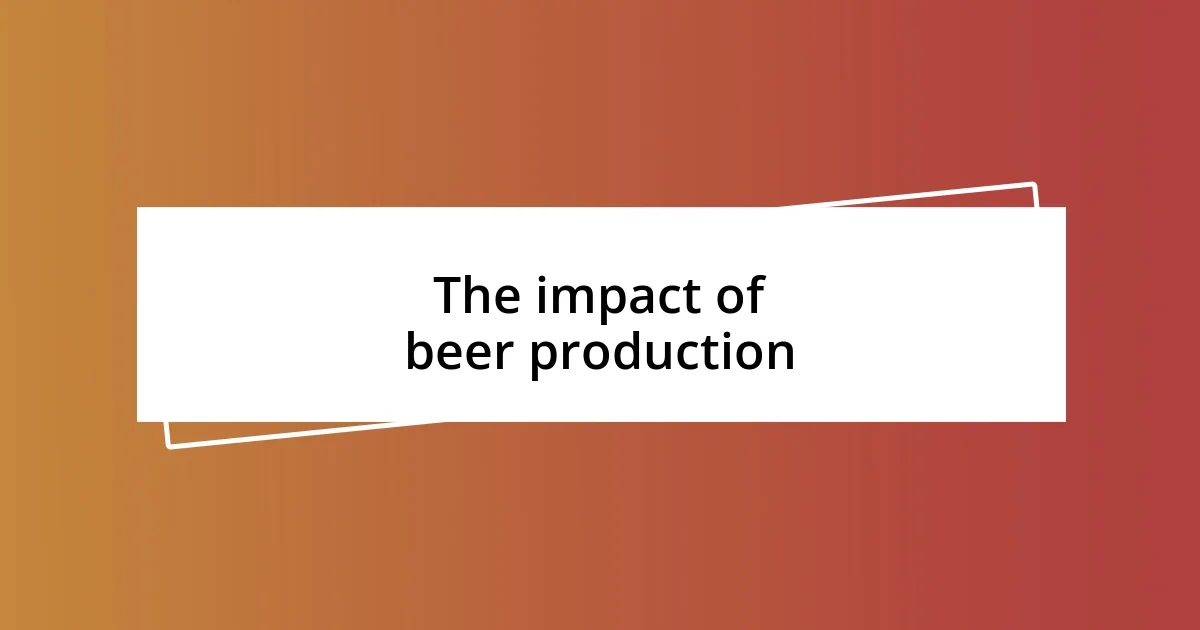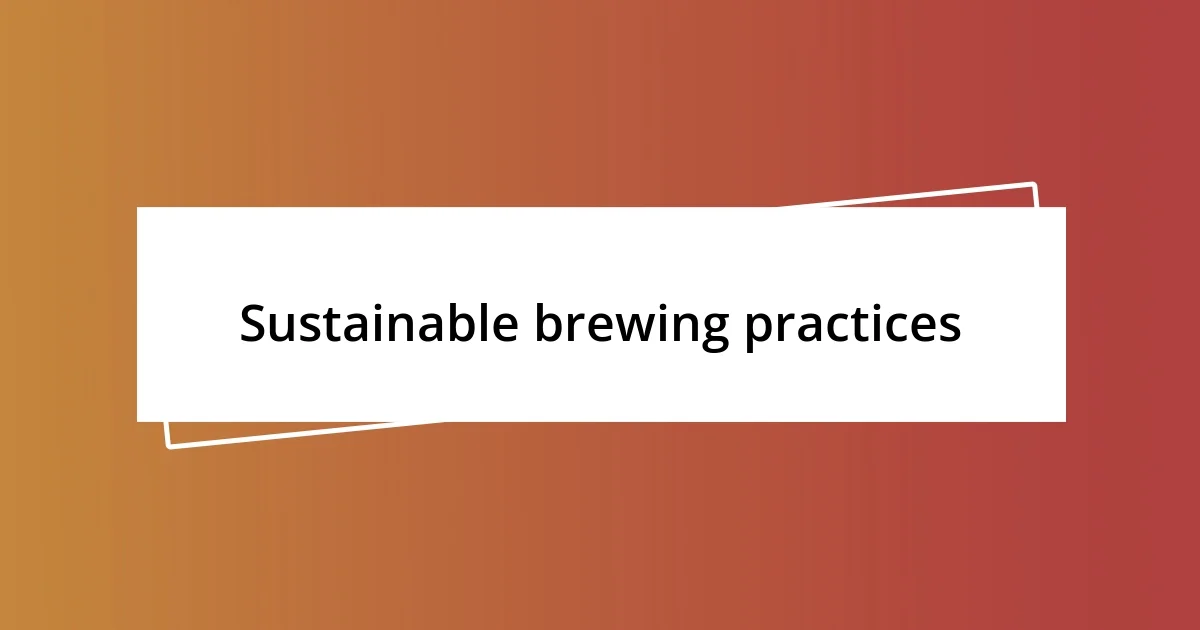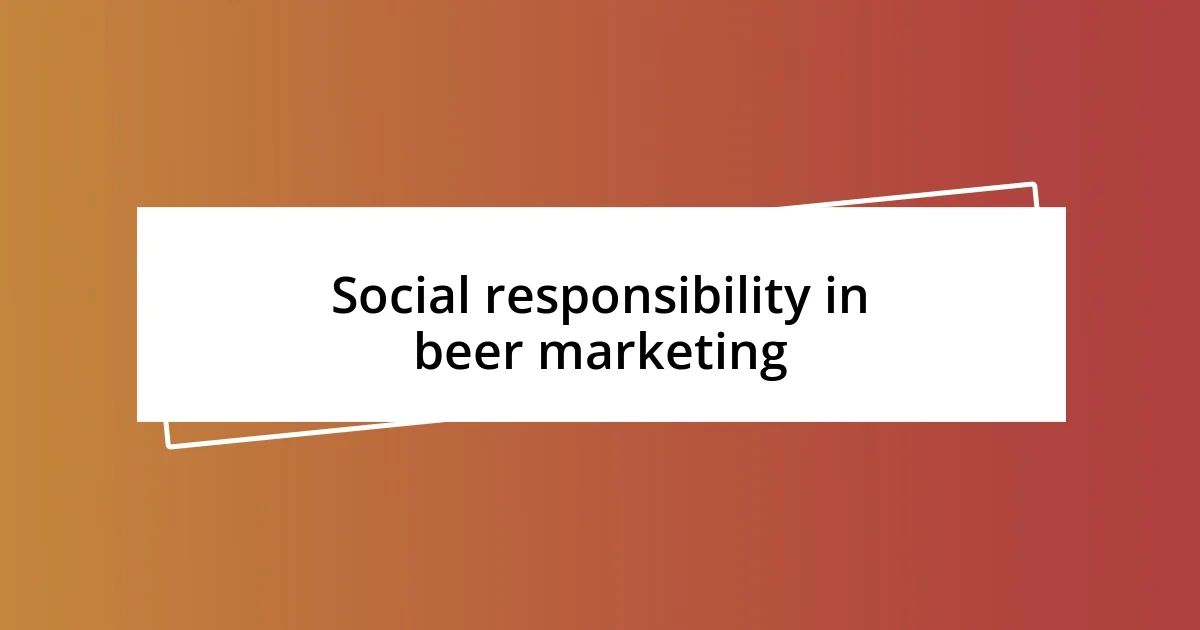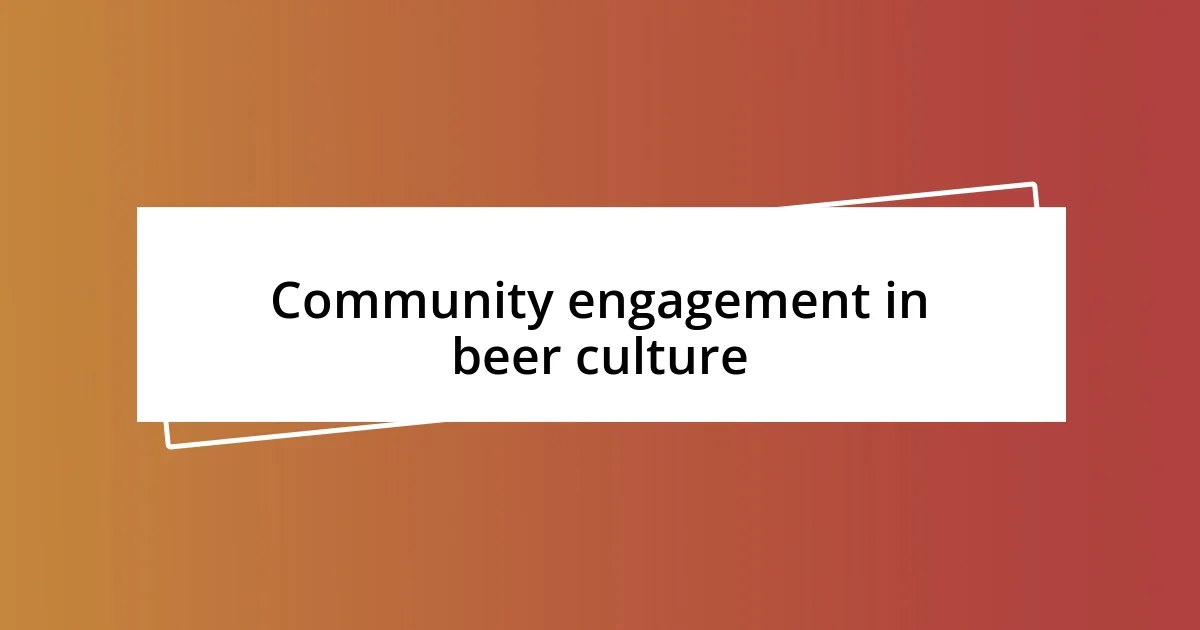Key takeaways:
- Ethics in beer production extend beyond taste to encompass sustainability, fair labor practices, and responsible sourcing, impacting both the environment and communities.
- Sustainable brewing practices include energy efficiency, water conservation, and waste reduction, highlighting breweries’ commitment to ecological responsibility.
- Community engagement in beer culture promotes inclusivity and education, fostering a shared appreciation for craft beer and its social responsibility.

Understanding beer ethics
When I think about beer ethics, I often find myself reflecting on how my choices impact not just my palate but also the environment and the community. Have you ever considered where your beer is coming from? Supporting local breweries can feel incredibly rewarding; I remember visiting a small craft brewery and discovering their dedication to sustainability and community support, which deepened my appreciation for every sip.
Ethics in beer production go beyond just sourcing ingredients; they also encompass the treatment of workers and the broader social responsibility of breweries. I recall a brewery that went above and beyond to ensure fair wages for all its employees and even involved them in decisions about the business. Isn’t it uplifting to purchase a product that not only tastes good but also embodies fairness and integrity?
Furthermore, the notion of responsible consumption plays a crucial role in beer ethics. We’ve all been there, indulging in a few too many pints during a night out, but what’s the true cost of that enjoyment? I’ve learned to appreciate moderation and the communal aspect of sharing a beer with friends, making each experience not just pleasurable, but thoughtful and intentional.

The impact of beer production
The impact of beer production is multilayered, touching on various aspects of our environment and society. I often think back to my trip to a brewery nestled in the hills, where the brewers proudly explained their efforts to minimize water usage and recycle waste. It was enlightening; I realized that beer isn’t just a drink—it’s a reflection of our choices that can either harm or nurture our planet.
- Water Usage: Beer production is notoriously water-intensive, often requiring several liters of water to produce just one liter of beer. This raises concerns in regions facing water scarcity.
- Energy Consumption: The brewing process involves significant energy use, particularly during fermentation and refrigeration. Sustainable practices are essential to reduce this carbon footprint.
- Local Sourcing: Many breweries are now prioritizing local ingredients, which not only supports regional economies but also lowers transportation emissions.
- Waste Management: Craft breweries often repurpose spent grains for animal feed or biofuel, showcasing innovative ways to reduce waste.
Reflecting on these impacts makes me ponder my own choices at the store. Choosing a brewery that prioritizes sustainability feels rewarding, much like the time I attended a community beer festival where local brewers shared their eco-conscious initiatives. I left feeling inspired, realizing that each bottle carries not only flavor but also a story about responsibility and care for both the environment and the community.

Sustainable brewing practices
Sustainable brewing practices are gaining traction as breweries embrace eco-friendly methods. For instance, I visited a brewery that implemented energy-efficient technologies, including solar panels. Seeing how they harnessed renewable energy to brew beer made me appreciate that sustainability can taste good too. It’s like when you savor a well-crafted lager, knowing it’s brewed with care for the planet.
Water conservation is also a major focus for many brewers. One time, I toured a facility where they collected rainwater to use in brewing. The brewer enthusiastically shared how this not only reduced their operational costs but also demonstrated their commitment to the environment. It was inspiring to see how a simple practice can have a significant impact on resource efficiency.
Moreover, waste reduction strategies in brewing are truly remarkable. A local brewery I support turned their spent grains into artisan bread sold at a nearby bakery. I was so impressed that I purchased a loaf right after my tasting tour. It added an extra layer of meaning to my experience, knowing that the beer I enjoyed directly contributed to both reducing waste and supporting the local economy.
| Practice | Description |
|---|---|
| Energy Efficiency | Using renewable energy sources like solar power to reduce the carbon footprint of brewing operations. |
| Water Conservation | Implementing methods such as rainwater harvesting to minimize water usage in the brewing process. |
| Waste Reduction | Repurposing brewing byproducts, like spent grains, for useful products such as animal feed or food items. |

Fair trade ingredients in beer
When I first learned about fair trade ingredients in beer, I was genuinely surprised by the impact it could have on global communities. Imagine sipping on a craft brew knowing that the barley, hops, or even the sugars used in fermentation were sourced from farmers who receive fair wages and work in good conditions. It makes each sip feel not just refreshing but like a small act of solidarity with those who cultivate these essential ingredients.
During a tasting event, I met a brewer who passionately described how fair trade practices allowed him to establish direct relationships with farmers overseas. It reminded me of how our choices in purchasing can influence lives thousands of miles away. This connection not only ensures quality but fosters a sense of accountability—every bottle carries with it a promise of equitable treatment for the people behind the scenes, the very foundation upon which our favorite beers are built.
Choosing beers made with fair trade ingredients also offers a chance to advocate for sustainability and social responsibility. I often ask myself: how many beers are we willing to pass up in favor of those that don’t just taste good but do good? It’s a powerful question and one that I hope others consider as they browse the shelves. Every pint can contribute to a larger, positive change, ensuring that brewing remains about community support, fairness, and ethical practices.

Social responsibility in beer marketing
Social responsibility in beer marketing isn’t just a trend; it’s essential for fostering a healthier drinking culture. I remember attending a beer festival where one brewery chose to promote moderation over excess, creating vibrant displays that encouraged responsible consumption. It was refreshing to see a company prioritize the well-being of its consumers rather than simply pushing for more sales. This approach not only resonated with attendees but also made me reflect on my own habits.
Another intriguing aspect of responsible marketing is how it can influence community perceptions of beer. At a local pub, I noticed a campaign aimed at highlighting non-alcoholic options alongside traditional brews. The brewer shared how this inclusivity attracted a broader audience, and honestly, I appreciated being given a choice without feeling left out. Isn’t it great when marketing allows everyone to feel included, whether they’re looking for a refreshing beer or a tasty alternative?
Moreover, I’ve seen breweries engage in campaigns that focus on the impact alcohol can have on health and social issues. At one brewery, I came across a program aimed at raising awareness about binge drinking. The candid discussions they facilitated after tastings sparked genuine conversations among patrons. It made me ponder: How can our industry further advocate for responsible drinking while still celebrating the joy that good beer brings? Emphasizing these narratives not only enriches the brand but also cultivates a more mindful drinking environment for all.

Encouraging responsible consumption
When I think about encouraging responsible consumption, I can’t help but recall a night out with friends where we decided to prioritize quality over quantity. Instead of ordering several rounds, we opted for a couple of thoughtfully chosen craft beers, savored each sip, and truly engaged with the flavors. This experience not only deepened our appreciation for the brews but also led to more memorable conversations, illustrating how slowing down can transform our relationship with beer.
I’ve also witnessed the power of community initiatives aimed at promoting responsible drinking. At a local brewery’s open mic night, they offered a special discount on non-alcoholic beverages, creating an atmosphere where everyone could participate without pressure to drink alcohol. Seeing friends enjoy a night out, regardless of their choice to consume alcohol, was uplifting. Isn’t it empowering when we can celebrate together, enabling each person to enjoy the experience in a way that feels right for them?
Encouraging responsible consumption often means fostering a mindset where moderation is the goal. I remember engaging in a discussion with a bartender who highlighted the importance of educating customers about alcohol content and serving sizes. He shared how simple conversations about what makes a balanced drinking experience can significantly impact someone’s choices. This approach made me wonder: how often do we consider not just what we drink, but how we drink—and how can a simple discussion shift our habits for the better?

Community engagement in beer culture
I’ve often found that beer culture thrives when it’s nurtured by community involvement. At a recent neighborhood block party, local breweries showcased their best offerings while promoting sustainable practices, from recycling programs to locally sourced ingredients. It was inspiring to witness how these businesses actively engaged with the community, creating a sense of camaraderie that went beyond just selling beer.
It’s fascinating how collaborative events can bring people together and enrich beer culture. An unforgettable evening for me was a charity event where several breweries pooled their resources to support a local cause. Not only did everyone enjoy unique beer pairings, but we also felt connected to something bigger than ourselves. I think about how powerful it is when beer becomes a vehicle for community support—has there ever been a better reason to gather with friends?
Beyond just shared experiences, I believe that education plays a crucial role in community engagement within beer culture. During a craft beer class I attended, the brewer passionately shared stories about the history of ingredients and brewing techniques. I remember how captivated we all were, igniting deeper discussions about our favorite brews. Isn’t it amazing how knowledge can transform appreciation? When we learn together, we build a more informed and inclusive beer community.














